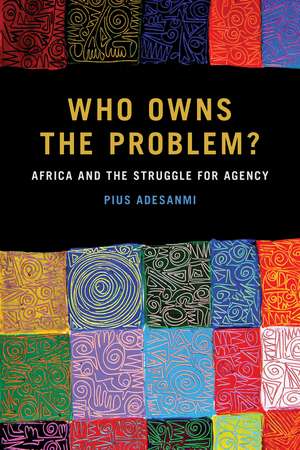Who Owns the Problem?: Africa and the Struggle for Agency: African Humanities and the Arts
Autor Pius Adesanmien Limba Engleză Paperback – 31 ian 2020
committed and passionate voice of an African writer lost far too soon. Adesanmi urges his readers to commit themselves to Africa’s cultural agency.
Preț: 223.15 lei
Nou
Puncte Express: 335
Preț estimativ în valută:
42.70€ • 43.73$ • 35.52£
42.70€ • 43.73$ • 35.52£
Carte indisponibilă temporar
Doresc să fiu notificat când acest titlu va fi disponibil:
Se trimite...
Preluare comenzi: 021 569.72.76
Specificații
ISBN-13: 9781611863550
ISBN-10: 1611863554
Pagini: 208
Dimensiuni: 152 x 229 x 18 mm
Greutate: 0.3 kg
Ediția:1
Editura: Michigan State University Press
Colecția Michigan State University Press
Seria African Humanities and the Arts
ISBN-10: 1611863554
Pagini: 208
Dimensiuni: 152 x 229 x 18 mm
Greutate: 0.3 kg
Ediția:1
Editura: Michigan State University Press
Colecția Michigan State University Press
Seria African Humanities and the Arts
Recenzii
“Long after you have read them, the insights of these essays stay with you, almost in the same manner in which the memory of his life and work, now that he
is gone, remain indelible. No other person writes of Africa in the world and the world in Africa like Pius Adesanmi. Consistently passionate, witty, humorous,
and yet rigorously researched and thought through, the essays collected in this book are sure to create a new benchmark for activist intellectualism in public
discourse in the social media.”
—BIODUN JEYIFO, former Professor in African and African American Studies and Comparative Literature, Harvard University
is gone, remain indelible. No other person writes of Africa in the world and the world in Africa like Pius Adesanmi. Consistently passionate, witty, humorous,
and yet rigorously researched and thought through, the essays collected in this book are sure to create a new benchmark for activist intellectualism in public
discourse in the social media.”
—BIODUN JEYIFO, former Professor in African and African American Studies and Comparative Literature, Harvard University
Before his untimely death, Pius Adesanmi had emerged as one of Africa’s leading public intellectuals and as an astute interpreter of the African imagination. In this collection he speaks to us from the land of the ancestors with a voice that is both cautionary and prophetic, providing one of the best diagnoses of the African problematic that I have read in many years. Combining sharp analysis with humor, this book is an invitation to all of us to rededicate our commitment to Africa’s continuing struggle for agency in the twenty-first century.
Long after you have read them, the insights of these essays stay with you, almost in the same manner in which the memory of his life and work, now that he is gone, remain indelible. No other person writes of Africa in the world and the world in Africa like Pius Adesanmi. Consistently passionate, witty, humorous, and yet rigorously researched and thought through, the essays collected in this book are sure to create a new benchmark for activist intellectualism in public discourse in the social media.
Notă biografică
PIUS ADESANMI (1972–2019) was a scholar, writer, literary critic, satirist, and columnist.
Descriere
How may we conceptualize Africa in the driver’s seat of her own destiny in the twenty-first century? How practically may her cultures become the foundation and driving force of her innovation, development, and growth in the age of the global knowledge economy? How may the Africanist disciplines in the humanities, the social sciences, and the natural sciences be revamped to rise up to these challenges through new imaginaries of intersectional reflection? This book assembles lectures given by Pius Adesanmi that answer these questions. His lecture delivery techniques combine with diction and borrowings from Nigerian popular culture to create a distinct African performative mode that ultimately becomes a form of resistance against Western ideals of knowledge transfer. Together, these short essays preserve the committed and passionate voice of an African writer lost far too soon. Adesanmi urges his readers to commit themselves to Africa’s cultural agency.





